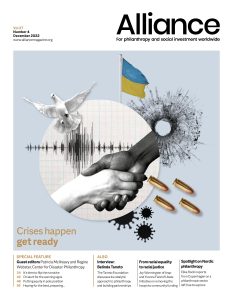Occasionally, the development ‘industry’ can send me into full-on ‘grumpy old man’ mode – and some of the patronising ill-informed programming around ‘resilience’ is an example of why.
The excellent discussions facilitated by colleagues from PJSP and inspired by Eva and Halima and captured in the paper Understanding resilience in international development, demonstrated the complexity of the term ‘resilience’, yet it is bandied about by donors and NGOs as if it is the commonly shared goal (‘resilient communities’) and a newly discovered priority the challenge now is to help people be more resilient in the face of growing vulnerability. No! People are resilient. In fact, most of them would prefer not to have to be so resilient.
I have been reflecting on the issue of resilience in the context of Micaia’s work with thousands of people across three very different landscapes of central Mozambique. We’ve just had a bad year with our baobab work, and both our social enterprise that sells organic baobab powder (Baobab Products Mozambique/ BPM) and the 3,500 women who supply the company, have suffered. The harvest was poor, and very late rains damaged early harvested fruit in store. The result of this climate-induced shock to the value chain was a drop of 40 per cent in income for the women. In 2021, the honey harvest in a very different area, the forest communities around Chimanimani National Park, was badly damaged by storms and unseasonal rains. Our honey company bought only 60 per cent of the volume of comb honey it bought in 2020. In other words, our more volatile climate is making life more difficult for people who live off the land. But are people responding in any different way? Do they need to be ‘more resilient’? No. They already know exactly what the loss of money from honey or baobab sales means – this season there will be no new investments. Belts will be tightened (further).
In some areas, the increasing frequency of droughts is making life in some villages not really viable. People are responding in logical ways, moving to different villages where there is a well, or to one of the growing small towns where there are services. What they are not doing is waiting to be helped to become more resilient.
People are resilient. In fact, most of them would prefer not to have to be so resilient.
The point is that when we are not looking, i.e., when we are not engaging people in a project intervention (a community meeting, a training, a demonstration etc), people get on with their various personal and familial strategies of dealing with the norm of vulnerability. We talk about ‘diversifying livelihood strategies’ – undeniably important – but scratch the surface of the community and we find lots of local trade taking place from charging cell phones, to making doughnuts or beer, to selling wild-harvested food. Young men go and join (mostly illegal) artisanal gold mining operations. Young women go to the town to sell their bodies. We find patterns of migrant labour that we didn’t know existed. We come to recognize a spread of large landholdings that demonstrates long familial rootedness. When people engage with projects they do so in informed ways, making judgements that are a sort of basic cost-benefit analysis. In this way, resilience at the household level, particularly in a country in which the system of rewards is so embedded, is a form of opportunism. Projects come and go. Take what you can while it’s on offer. And back in the village, life goes on as normal.
So, when we are designing projects or calls for proposals, we should do so recognizing that people are incredibly resilient and adaptable. What we can do is offer opportunities to either help them do what they currently do more productively/efficiently etc, or connect them with better markets, or inject some new ideas, or create an entirely new additional opportunity.
None of these reflections should suggest complacency or even grudging acceptance of the status quo. The fact that people are so resilient and adaptable in the face of so many political, economic and natural forces that make their lives so difficult, should never deter us from working for transformative systemic change that will make such resilience less essential. Similarly, the resilience of families and communities often incorporates maintained power systems that are deeply disempowering of women and girls – the economic value of the ‘bride price’ being one pervasive example.
This means that we must give far greater emphasis to working for system change at all levels from household to nation-state. What does this mean in practice? It means supporting properly rooted local organizations that are working with people and communities over the long term and that can therefore ride the vicissitudes of fortune and trends of donor funding with one eye at least fixed on the core issues (even if the other is monitoring the calls for proposals). It means building in flexibility and being less tied to tangible outputs, focusing instead on powerful processes and learning. Change in systems is messy and unpredictable. It means enabling connections and shared learning between communities and local organizations such that in time a movement from the base might just emerge that can collectively challenge systemic injustice.
In one of the meetings facilitated by PJSP, Eva said something like, ‘resilience is what we need while we work for transformative change’. I agree with that statement, but only because I interpret the first part to reflect the current reality – that people, especially the most vulnerable, are incredibly resilient – and the second part to be a clarion call for a community-driven movement for change.
Andrew Kingman is co-founder of the Micaia ‘family’ of non-profit foundation and social enterprises and serves as Managing Director of Eco-Micaia Ltd and its subsidiaries.
Upcoming issue: Crises happen: get ready
 The December 2022 issue of Alliance magazine explores the role of philanthropy in crises and suggests that acting before the fact – rather than simply reacting – is the way ahead. The issue is guest-edited by Patty McIlreavy and Regine Webster of the Center for Disaster Philanthropy.
The December 2022 issue of Alliance magazine explores the role of philanthropy in crises and suggests that acting before the fact – rather than simply reacting – is the way ahead. The issue is guest-edited by Patty McIlreavy and Regine Webster of the Center for Disaster Philanthropy.
Subscribe today to make sure you don’t miss it!






Comments (0)